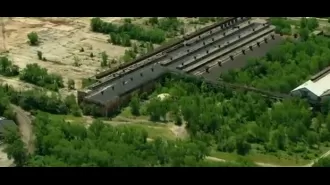Call for nature-based planning in light of the Uttarakhand tunnel tragedy to reduce human suffering.
December 1st 2023.

The entire nation was on the edge of their seats this week, watching as the 41 workers trapped in the Silkyara-Barkot tunnel in Uttarakhand were one by one pulled to safety after 17 long and gruelling days. This event has sparked an important discussion about the environmental impact of infrastructure projects.
Chief Minister Pushkar Singh Dhami has declared that there should be a review of all the tunnel projects in the state, as well as the load-bearing capacity of hill towns that dot the mountain state. This is an important step in the right direction, and it is high time that the simple yet powerful axiom that ecologists and locals have been articulating - that it is not possible to construct infrastructure projects on leaders’ whims or purely on economic reasons without factoring in the local ecology - becomes widely accepted as the only way forward.
It is a mystery why, in a geologically diverse and ecologically rich terrain like India, nature-based planning and implementation of infrastructure projects is not the default mode of economic development. It took decades for the Environment Impact Assessment to become a mandatory part of a project proposal, but even so, it is often given short shrift in the way projects are planned and work on them begun.
The Char Dham road project in Uttarakhand is one example of a project that has been warned about since the start. Local residents living along the hills have reported serious instances of land subsidence in the region, which many believe led to the tunnel collapse. The Uttarakhand region is incredibly ecologically diverse, yet incredibly fragile. It is vital that any project undertaken in this region is done with due care.
It is clear that there can be no disagreement that both tourists and locals need to be provided with the best of infrastructural services. However, the cost of economic development and infrastructure construction cannot be ecological destruction. The myth of economy versus environment is a false binary; there is no choice between the two. Climate change has shown that mindless environmental damage will place a heavy price on people as well as their economies. The only way forward is nature-based planning.
Chief Minister Pushkar Singh Dhami has declared that there should be a review of all the tunnel projects in the state, as well as the load-bearing capacity of hill towns that dot the mountain state. This is an important step in the right direction, and it is high time that the simple yet powerful axiom that ecologists and locals have been articulating - that it is not possible to construct infrastructure projects on leaders’ whims or purely on economic reasons without factoring in the local ecology - becomes widely accepted as the only way forward.
It is a mystery why, in a geologically diverse and ecologically rich terrain like India, nature-based planning and implementation of infrastructure projects is not the default mode of economic development. It took decades for the Environment Impact Assessment to become a mandatory part of a project proposal, but even so, it is often given short shrift in the way projects are planned and work on them begun.
The Char Dham road project in Uttarakhand is one example of a project that has been warned about since the start. Local residents living along the hills have reported serious instances of land subsidence in the region, which many believe led to the tunnel collapse. The Uttarakhand region is incredibly ecologically diverse, yet incredibly fragile. It is vital that any project undertaken in this region is done with due care.
It is clear that there can be no disagreement that both tourists and locals need to be provided with the best of infrastructural services. However, the cost of economic development and infrastructure construction cannot be ecological destruction. The myth of economy versus environment is a false binary; there is no choice between the two. Climate change has shown that mindless environmental damage will place a heavy price on people as well as their economies. The only way forward is nature-based planning.
[This article has been trending online recently and has been generated with AI. Your feed is customized.]
[Generative AI is experimental.]
0
0
Submit Comment





